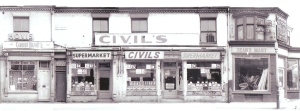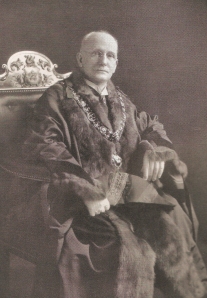
Civil’s supermarket around 1970, previously the premises of Thomas Watson Walker (Michael Westmoreland)
In 1969, shortly before Charnwood Street was demolished, 191 – 195 were occupied by Civil’s grocers, but for many years before that they were the premises of the wholesale grocer and provision merchant Thomas Watson Walker – or ‘TW’ as he was known in the family.
Dorothy Walker, his great niece, whose grandfather Alfred also worked in the business, remembered being taken to the shop as a child in the late 1920s and early 1930s:
To me the shop seemed very large and I was fascinated to see the flitches of bacon hanging up, the very large cheeses from which the required portions were cut, and sacks of rice, sago, flour etc. ready for weighing out. Dried fruits came in wooden boxes. Sugar also came in large bags and was weighed into thick blue paper bags ready to be sold. Butter and lard came in boxes from which they were carved with a large knife at the customer’s request. The lard and bacon boxes were large and I remember Grandfather bringing home two for my mother, who scrubbed the fat and salt from them, turned them on end and fitted a small curtain at the front to make kitchen cupboards. Very few supplies came ready packaged in those days, though of course there were cartons and tins of cocoa, gravy salt, soap powders etc. as well as jars of jam and marmalade and packets of soup powder, some of whose brand names still survive.
The most attractive feature to me as a small child was the row of large cubical tins with clear lids which were ranged in front of part of the counter. They contained a wide variety of, mostly sweet, biscuits. I was allowed to choose one to eat; it was usually a “sandwich” biscuit with jam or cream in the middle and a smiling face cut into the top biscuit to reveal the jam.
The counter was polished wood with, I think, a chair in front of it for the customer. On the counter was an old-fashioned till whose bell “pinged” when the drawer was opened and the price was flagged up on white cards in a little window. There were two sets of balances, one on the end of the counter for lighter goods and a heavier set of scales on the floor. I think there was also a marble slab on the counter on which the butter or lard was shaped and wrapped into white waxed paper. Orders were assembled and delivered in the basket of a delivery bicycle by a “boy”. At one time, too, the firm had a stall on Leicester Marker from which Grandfather sold a wide variety of cheeses [listed in Kelly 1922 as a cheese factor at the Corn Exchange]. “TW” also had a farm near Oadby.
Grandfather worked very long hours, getting up at 5 am to go down to the Wholesale Market to order the bacon etc. to be delivered. I cannot remember what time the shop closed in the evening. Grandfather was, apparently, very skilled at boning and rolling the flitches, and was begged by one of the importers at the market to go and work for him at the meat market in Chicago, from where some of the bacon was exported, but he refused the job. “TW” was the older brother and Grandfather was born in 1867. Grandfather retired in the late forties or early fifties.
Thomas Watson Walker was born in Leicester in 1856, the son of Thomas Walker, a shoemaker from Newton Linford. He was educated at Curzon Street School and later studied at the Vaughan Working Men’s College. He first set up in business around 1876, and in the 1881 Census he is recorded at 117 Curzon Street in Leicester with his wife Martha and son Thomas, where he was trading as a grocer and provisions dealer. Soon after this he moved to Charnwood Street, where he started with one shop between St Saviour’s Road and Edwyn Street (originally 81 Charnwood Street but renumbered as 193 by 1899 after the street was extended).
An invoice from June 1893 in the Record Office for Leicestershire, Leicester & Rutland describes him as a ‘wholesale & retail provision merchant… TERMS: BUTTER, EGGS AND TINNED GOODS NETT CASH’, supplying on this occasion 60 eggs for three shillings, 120 eggs (presumably of a different size) for seven shillings and sixpence, a belly of bacon for seven shillings ninepence halfpenny, a small roll of bacon for fourteen shillings one penny, and quantities of American cheese and dairy butter for seven and seven pence halfpenny and eight shillings respectively.
By 1908 the business had taken over the adjacent property at 191, and by 1925 it incorporated 195 Charnwood Street as well. In 1900 he was elected as a Liberal councillor for the West Humberstone ward of the Borough Council with a large majority (900 votes to his opponent’s 163), ‘not surprisingly…’, in the view of the Leicester Guardian (25 November 1900):
for he has lived and worked in the ward for a great many years. He has a large grocer’s shop in Charnwood Street which is well-known all over the district… and is entirely a self-made man… [succeeding] by sheer force of character… He is a strong-minded, common-sense, thoughtful man, with much energy and perseverance, keen business powers and a good heart, and these qualities have not only made him prosperous, but have made him much respected amongst all with whom he had had dealings.
He held this office continuously until 1923 when he was elected as an alderman, serving as Chairman of the Street Cleansing, Sanitary & Baths, and Parliamentary & General Purposes Committees. In the latter capacity he oversaw the construction of the municipal aerodrome at Braunstone and the arrangements leading up to the extension of the Borough boundaries in 1936. He became Mayor of Leicester in 1926 – 27, when he twice received the Prince of Wales, later Edward VIII, on visits to the city. He was thanked by the Council at the end of his year of office for ‘the ability he has displayed on all occasions when his public services have been in demand. His courtesy and consideration at all times have earned the high appreciation of the citizens of Leicester’. He resigned from the Council in 1934 due to ill health following an accident close to his home at 333 Humberstone Road, when he was knocked down by a bicycle.
He had attended Curzon Street Primitive Methodist Church as a boy and was a lay preacher and Superintendent of the Sunday School there for many years. He was also President and Vice-President of the Leicestershire Sunday School Union, which presented him with an illuminated address on his retirement from office: he was described in his obituary in 1936 as ‘one of the oldest Sunday School workers in the city’. He also served as President of the Leicester Grocers’ Association on several occasions. He was married twice, first to Martha Burton in 1878, and in 1918 to Florence Gertrude Mincher. He died in February 1936 at the home of his son Thomas W. Walker at Oadby Grange, and was buried at Welford Road Cemetery following a funeral at Curzon Street Methodist Church. The business was carried on after his death by his son.
Many thanks to Dorothy Walker for her memories of ‘TW’ and his shop. Additional information from C. Howe, Leicester: its civic, industrial, social and institutional life (Midland Service Agencies, 1927); Minutes of Leicester Borough Council; Leicester Guardian, 25 November 1900; Leicester Evening Mail, 5 February 1936.

